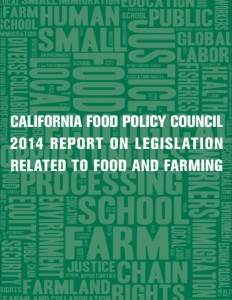New Report Gives CA Elected Officials a ‘Needs Improvement’ Grade on Food and Farm Policy
November 17, 2014 Roots of ChangeRoots of Change and the California Food Policy Council tackle unifying concerns
 OAKLAND, CA (November 17, 2014) – A report released today by Roots of Change and the California Food Policy Council (CAFPC) unveils 2014 food and farm policy voting results by California elected officials. The 2014 Report on Legislation Related to Food and Farming illustrates how despite making modest progress on food and agriculture issues, the Legislature continues to miss the mark when it comes to passing the transformative – and often controversial – policies needed to address our state’s food, farming and economic challenges.
OAKLAND, CA (November 17, 2014) – A report released today by Roots of Change and the California Food Policy Council (CAFPC) unveils 2014 food and farm policy voting results by California elected officials. The 2014 Report on Legislation Related to Food and Farming illustrates how despite making modest progress on food and agriculture issues, the Legislature continues to miss the mark when it comes to passing the transformative – and often controversial – policies needed to address our state’s food, farming and economic challenges.
Ratified by 19 local food policy councils that form California’s first effective coalition for food system change, this report represents an unusually unified perspective from constituencies representing the diversity of California: rural and urban, conservative and progressive, affluent and low-income. The need for deep policy reform is bringing together a strong base of Californians from Humboldt and Shasta to Sacramento to Orange County, who are determined to push their legislators toward positive change.
Of the 22 priority bills tracked this year by the CAFPC, nine were signed by Governor Jerry Brown. Included in this group were bills that protect bees (AB 1789); streamline some aspects of CalFRESH (AB 1930) and AB 2413, a bill that establishes the California Office of Farm to Fork, which sets the stage for much needed food system change. Three of the tracked bills were vetoed. The remaining bills died in committee or on the floor. “We are heartened by the Legislature’s willingness to consider a broader range of food system issues than ever before, a sign that the efforts of the grassroots food movement are gaining influence in Sacramento,” said Roots of Change President Michael Dimock. At first glance, this presents a hopeful picture.
But these results don’t tell the complete story. Many of the most innovative bills, those intended to truly move the needle on critical food system issues like protecting the effectiveness of antibiotics (AB 1437), ensuring a livable minimum wage (SB 935), and labeling GMOs and soda (SB 1381, SB 1000), all failed to advance.
Unfortunately, the biggest influence in California’s food and agriculture politics remains that of large corporations and trade groups. PepsiCo, along with its local members and the Chamber of Commerce, led successful lobbying efforts to kill legislation that would have added warning labels to most sugar-sweetened beverages (SB 1000), and contributed to the demise of Senator Mark Leno’s SB 935, which would have added a cost of living adjustment to the state minimum wage.
“California is facing an epic struggle against corporate giants spending unprecedented amounts of money to influence policy making in our state capitol. In Oakland, we’re fighting back with local policy initiatives, but our work is still operating in the context of statewide policies that support profits and not people. With elevated rates of diet-related disease affecting our low-income communities, this is unacceptable and needs to change. Our Council is taking action, fostering local ownership of the food system through low capital start-ups like the Hustle Guide, getting handmade, affordable, culturally appropriate and healthy food on the table instead of Happy Meals,” said Esperanza Pallana, Director of the Oakland Food Policy Council and member of the CAFPC Policy Committee.
With this report, the California Food Policy Council completes its second successful year of collaboration on statewide food policy, and celebrates the addition of six new members. With the recent election calling into question recent incremental progress made in national food and farm policy, we need California elected officials to exert their vision and leadership on these issues more than ever.
About Roots of Change
Roots of Change is a ‘think and do tank’ dedicated to developing a CA food system that is healthy, equitable and resilient. Since 2000, Michael R. Dimock, President, has grown ROC into a resource for the food movement, creating collaborations between agriculture and NGOs, community organizations and policy experts that have never before sat together in the same room. Since 2013, ROC has served as the backbone of the California Food Policy Council, a statewide collaboration of 25 diverse food system reform groups, that believes sound food and farm policy is key to promoting vibrant communities and a healthy future. Today, ROC’s network includes a base of 80,000 engaged constituents and reaches a national audience via Dimock’s writing on CivilEats.com. Based in Oakland, CA, ROC is a program of the Public Health Institute. Facebook: Roots of Change. Twitter: @RootsofChange